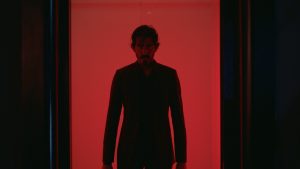Director Tomáš Vorel has achieved new heights with Gympl (English title: The Can), a compelling and resonant look at the generation gap in contemporary Czech society. The exaggerated stylistics of the director´s previous film, Skřítek, are still on display, but the cartoon characters have been replaced here by human ones, which lend the film an unexpected and surprisingly profound weight. And despite the potentially serious nature, Gympl is consistently funny, often laugh-out-loud so.
The director´s son, Tomáš Vorel jr., stars as Petr Kocourek, a troubled student with a single mother (Zuzana Bydžovská) who bides his time spraypainting graffiti around the city of Prague. When he chooses to attend school, he´s joined by friends Michal (Jiří Mádl), Pavla (Martina Procházková), and Klára (Lenka Jurošková), along with other classmates. There´s a sharp divide between the kids and their teachers and parents; neither generation understands the other, or wants to.
Despite some of the director’s over-the-top techniques, the adolescents here are some of the most harshly realistic I´ve seen in contemporary film. How far we´ve come since James Dean in Rebel Without a Cause; the punk generation brought us ‘rebels without a clue´, and now we have these kids, no longer rebels at all, just causeless and clueless. But the spirit of rebellion is still there; filled with emotion they don´t understand or know how to express, Petr and Michal spraypaint graffiti around Prague, Pavla cuts herself, Klára changes her style daily. They don´t know why they do these things, or what they hope to achieve; boredom seems to have defined their generation.
But teacher Tom (Tomáš Matonoha) – the only sympathetic adult character in the film – wants to understand his students. He invites them to his house, defends them against the other teachers, even goes out with Petr and Michal one night when they spraypaint the Letná metronome. Of course, the bond he attempts to build with the students will eventually lead to his downfall. He´s chastised for not conforming to the set lesson plan by the school´s headmistress, Mirka (Eva Holubová), and yet the attempts to reach his students still don´t succeed; Petr fails to write a paper on graffiti art – his passion, seemingly – because well, just because.
Graffiti is the perfect metaphor for these kids´ apathy. They (quite impressively) spraypaint an entire metro car over the course of a night, coming back in the morning to take a photo on a camera phone. They admit themselves that the ‘art´ will be removed in a couple hours – so what´s the point? The memory, the thrill? Vorel has no pretension of passing off some great motivation on the characters. There´s art in the form, but these characters don´t care about it. They just do it. They don´t know why, either.
Despite its serious nature – some scenes, in particular, can be difficult to watch – the film maintains a consistent comedic tone and is often hilarious. The director is a perfect match for this material, and what might have been (and usually is) uncomfortable melodrama instead becomes an off-kilter comedy that just happens to contain some all-too-resonant social commentary. Each character is exaggerated just enough to remain believable, and there´s just enough surrealism in the proceedings to make everything work.
The adult cast is filled with familiar faces from the Czech film and TV worlds, from the teachers (Jiří Schmitzer, Milan Šteindler) to the parents (Tomáš Hanák, Jan Kraus). None get the chance to really shine, but each does the most with their screentime. Director Vorel appears in a cameo as the school janitor, and Václav Marhoul (director of Mazaný Filip) shows up as a police officer. Superb Czech hip-hop soundtrack by Indy & Wich and Super Croo energizes the film throughout.
Cinematography is also excellent; the film give Prague – especially night Prague – a distinct and unusual feel. If you´re familiar with Vorel´s work, you´ll know his bizarre stylings; he´s toned it down enough here to allow the drama to work, and as a result produced his most successful feature.
I was reminded during several scenes of If…, Lindsay Anderson´s surrealist masterpiece, as well as other ‘angry young man´ films from 1960´s UK cinema. Here, however, the angry young man has been replaced by an indifferent one; the rigid divide between generations remains intact, but apathy almost cuts deeper than the anger. These kids don´t know where they´re going, nor do they seem to care; though they hate the society they live in, they lack the motivation to revolt. The violent finale of If is replaced here with a much more depressing one. There is no revolt; things remain the same – almost oppressively so. Causelessly, cluelessly, life continues along some undefined path.















